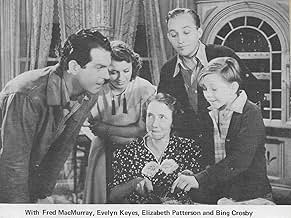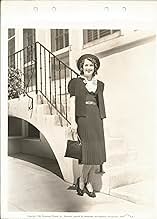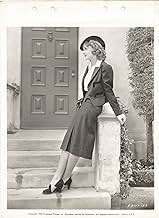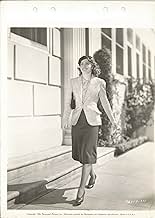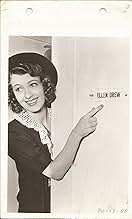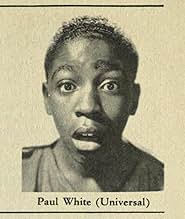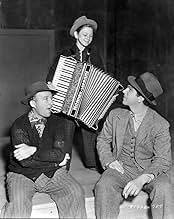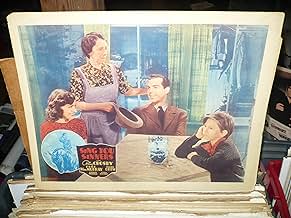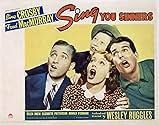Three singing brothers have different goals: Mike wants childhood fun, Dave seeks work and marriage, Joe chases risky schemes. Their shared singing act and Joe's secret gamble on a racehorse... Read allThree singing brothers have different goals: Mike wants childhood fun, Dave seeks work and marriage, Joe chases risky schemes. Their shared singing act and Joe's secret gamble on a racehorse lead to family tension.Three singing brothers have different goals: Mike wants childhood fun, Dave seeks work and marriage, Joe chases risky schemes. Their shared singing act and Joe's secret gamble on a racehorse lead to family tension.
- Awards
- 2 wins total
James Adamson
- Red Cap
- (uncredited)
Harry Barris
- Moose - Orchestra Leader
- (uncredited)
Harlan Briggs
- Customer at Gas Station
- (uncredited)
Marie Burton
- Minor Role
- (uncredited)
Ethel Clayton
- Minor Role
- (uncredited)
Chester Clute
- Race Tout at Lunch Counter
- (uncredited)
Heinie Conklin
- Lunch Counter Proprietor
- (uncredited)
Featured reviews
This is one of Bing Crosby's best films from the 1930s. It gave him a great opportunity to show off some dramatic ability and a couple of big selling hits one of which served as the title of the current biography by Gary Giddins.
Bing Crosby, Fred MacMurray and Donald O'Connor are the three Beebe brothers. And Bing is the source of much concern with mother Elizabeth Patterson. He's a lazy, shiftless, irresponsible and charming man who won't just settle down. The burden of supporting the family is left to brother Fred MacMurray who keeps postponing marriage to his long time sweetheart, Ellen Drew, until the family is all provided for. And finally kid brother Donald O'Connor idolizes Bing and wants to grow up just like him to the despair of Patterson and MacMurray.
Bing up and leaves the family, promising to go to Los Angeles, get into a steady business and settle down. Of course his idea of a steady business is to own a racehorse named Uncle Gus. He sends for Patterson and O'Connor and later MacMurray and Drew come and are all shocked.
The rest of the film is the usual run of movie plots where racehorses are concerned.
The Beebe brothers also have a singing act which MacMurray hates, but which brings in needed cash when the bills start piling up. That's where the musical score written by Jimmy Monaco and Johnny Burke comes in. Done as a trio number in the film, I've Got a Pocketful of Dreams became one of Crosby's biggest hits from the 1930s. Crosby's one solo number is Don't Let That Moon Get Away and in another trio number MacMurray is the lead singer in Laugh and Call It Love. Before he came to Hollywood, Fred MacMurray sang and played saxophone in various bands and also was in the original Broadway cast of Roberta. He had a pleasant, but thin tenor voice, but I don't think he'd have lasted in Hollywood if he had done musicals.
This was Donald O'Connor's first big break and he shows a hint of the dancing talent he had during the Pocketful of Dreams number. He and Crosby later re-united in the second version of Anything Goes in 1956.
One song was added into the score. Composed by Hoagy Carmichael and Frank Loesser, Small Fry was done as a novelty number by the trio. However Bing recorded it with his good friend Johnny Mercer and that novelty song also became a monster hit.
Sing You Sinners should be seen back to back with the James Cagney/Pat O'Brien film The Irish in Us as they have very similar plot development and characters.
This was the first of two Crosby films with a racetrack background, the other being Riding High. Curiously enough they had opposite plot conclusions. No spoilers here though, see both films and see what I mean.
Bing Crosby, Fred MacMurray and Donald O'Connor are the three Beebe brothers. And Bing is the source of much concern with mother Elizabeth Patterson. He's a lazy, shiftless, irresponsible and charming man who won't just settle down. The burden of supporting the family is left to brother Fred MacMurray who keeps postponing marriage to his long time sweetheart, Ellen Drew, until the family is all provided for. And finally kid brother Donald O'Connor idolizes Bing and wants to grow up just like him to the despair of Patterson and MacMurray.
Bing up and leaves the family, promising to go to Los Angeles, get into a steady business and settle down. Of course his idea of a steady business is to own a racehorse named Uncle Gus. He sends for Patterson and O'Connor and later MacMurray and Drew come and are all shocked.
The rest of the film is the usual run of movie plots where racehorses are concerned.
The Beebe brothers also have a singing act which MacMurray hates, but which brings in needed cash when the bills start piling up. That's where the musical score written by Jimmy Monaco and Johnny Burke comes in. Done as a trio number in the film, I've Got a Pocketful of Dreams became one of Crosby's biggest hits from the 1930s. Crosby's one solo number is Don't Let That Moon Get Away and in another trio number MacMurray is the lead singer in Laugh and Call It Love. Before he came to Hollywood, Fred MacMurray sang and played saxophone in various bands and also was in the original Broadway cast of Roberta. He had a pleasant, but thin tenor voice, but I don't think he'd have lasted in Hollywood if he had done musicals.
This was Donald O'Connor's first big break and he shows a hint of the dancing talent he had during the Pocketful of Dreams number. He and Crosby later re-united in the second version of Anything Goes in 1956.
One song was added into the score. Composed by Hoagy Carmichael and Frank Loesser, Small Fry was done as a novelty number by the trio. However Bing recorded it with his good friend Johnny Mercer and that novelty song also became a monster hit.
Sing You Sinners should be seen back to back with the James Cagney/Pat O'Brien film The Irish in Us as they have very similar plot development and characters.
This was the first of two Crosby films with a racetrack background, the other being Riding High. Curiously enough they had opposite plot conclusions. No spoilers here though, see both films and see what I mean.
Mother Beebe (Elizabeth Patterson) has three performing sons. Joe Beebe (Bing Crosby) is the reckless dreamer. David (Fred MacMurray) is the responsible one with long-suffering girlfriend Martha (Ellen Drew). Mike (Donald O'Connor) is the youngest one.
This is an interesting role for Bing Crosby. It is a change of speed for him and I like it. I thought that they may do a love triangle with the brothers. I like the story development with David and Martha. This is a musical, but it's not overloaded with songs. I do have a problem with a story element at the end. I can see why they did it, but I don't think it's realistic. I like this for the most part.
This is an interesting role for Bing Crosby. It is a change of speed for him and I like it. I thought that they may do a love triangle with the brothers. I like the story development with David and Martha. This is a musical, but it's not overloaded with songs. I do have a problem with a story element at the end. I can see why they did it, but I don't think it's realistic. I like this for the most part.
One of the great early Bing Crosby films, and probably the one that first displayed Bing's real acting ability that would lead to more dramatic roles in the future. But first and foremost it has Bing singing at his best, before Sinatra, before Presley, Bing had already done it all. It also featured a very young Donald O'Connor in a breakthrough role and the always delightful Fred MacMurray, and the 'Pocket Full of Dreams' number they all perform is one of the best musical numbers every put on film in my opinion. There's a lot more to the film as others have mentioned, but do yourself a favour, check it out if you haven't seen it, and see what real Hollywood entertainment was all about!
This Wesley Ruggles souffle, in which Bing Crosby, Fred MacMurray and Donald O'Conner are singing brothers who... well, it doesn't much matter, does it? Every character and situation is written right in the middle of the performer's comfort zone (not that Fred MacMurray ever felt much stretched; he claimed that Billy Wilder was the only director who ever called on him to act).
I had a good time and can't remember much of anything. It's just the sort of movie with production values meant to anchor a film program you go to because of Bing Crosby and the next day you tell the guys about the Popular Science short or maybe the latest Popeye. With Ellen Drew as MacMurray's fiancee and Elizabeth Patterson as everyone's mother.
I had a good time and can't remember much of anything. It's just the sort of movie with production values meant to anchor a film program you go to because of Bing Crosby and the next day you tell the guys about the Popular Science short or maybe the latest Popeye. With Ellen Drew as MacMurray's fiancee and Elizabeth Patterson as everyone's mother.
More musical numbers with the three male leads in this film would have been nice, and raised it a star or two. "Sing, You Sinners" is a nice pairing of three good musical talents. Bing Crosby was well-established as a singling star by this time, and Fred MacMurray was more known as a comedy and dramatic actor. But he too had a considerable musical background, and was able to use it in some of his earliest films. Along with those two established actors comes the young Donald O'Connor. This was just his second credited film, and his first major role. As a child actor, O'Connor showed fine talent for dancing and acting, that would be his forte in his adult career. Together in this film, the three make up the reluctant Beebe brothers trio.
The comedy in this film is on the light side, with a screenplay and story that was more dramatic because of the usually tense situation that the family found itself in. That was mostly because of finances since the dad died a few years before. Elizabeth Patterson does a good job as the mother, Mrs. Daisy Beebe, caring about her sons and trying to steer them in the right direction. Ellen Drew played Martha Randall, MacMurray's long-waiting fiancé.
It's a nice look at the talent of the three, and I think it would have been more entertaining with less of the wanderings and uncertainly of Crosby's Joe, and the guys making a go of it singing, dancing and playing instruments.
The comedy in this film is on the light side, with a screenplay and story that was more dramatic because of the usually tense situation that the family found itself in. That was mostly because of finances since the dad died a few years before. Elizabeth Patterson does a good job as the mother, Mrs. Daisy Beebe, caring about her sons and trying to steer them in the right direction. Ellen Drew played Martha Randall, MacMurray's long-waiting fiancé.
It's a nice look at the talent of the three, and I think it would have been more entertaining with less of the wanderings and uncertainly of Crosby's Joe, and the guys making a go of it singing, dancing and playing instruments.
Did you know
- TriviaThe role of Mike Beebe, played by Donald O'Connor, was originally meant for Mickey Rooney. But Rooney was scheduled to make another picture at the same time.
- ConnectionsReferenced in The John Garfield Story (2003)
Details
- Release date
- Country of origin
- Language
- Also known as
- The Unholy Beebes
- Filming locations
- Santa Anita Park & Racetrack - 285 West Huntington Drive, Arcadia, California, USA(the first track Joe goes to, places bets, and swaps tickets)
- Production company
- See more company credits at IMDbPro
- Runtime
- 1h 30m(90 min)
- Color
- Aspect ratio
- 1.37 : 1
Contribute to this page
Suggest an edit or add missing content

